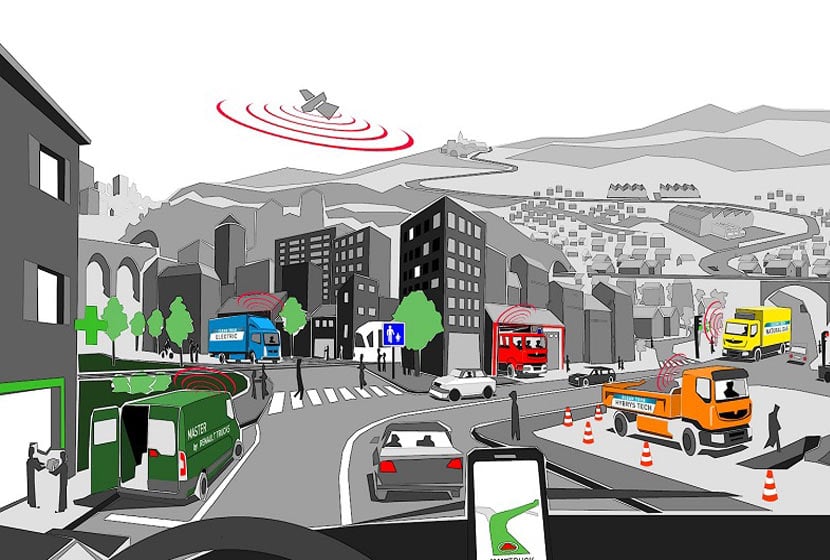The town of Issy-les-Moulineaux in the Hauts-de-Seine (92) is integrating a new European project to facilitate urban mobility.
Because the City of tomorrow is being developed today and intends to take advantage of all the possibilities offered by digital technology to improve daily life, the City of Issy-les-Moulineaux is participating, via the SEM IssyMédia, in a new project co-financed by the European Commission, ECIM (European Cloud Marketplace for Intelligent Mobility).
The objectives of the CMIT project
70% of the population of the European Union live in cities, urban mobility faces many problems: chronic traffic jams (estimated to cost 80 billion euros per year), lack of access to public transport, lack of access to public transport, lack of access to public transport, lack of access to public transport, lack of access to public transport, lack of access to public transport. (1)), poor air quality, high levels of noise and CO2 emissions, etc.
According to the European Commission, "a radical change is needed".
The ECIM project plans to use the cloud to enable cities and enterprises to develop, deploy or sell urban mobility applications. Through ECIM, innovators will be able to take advantage of an online "marketplace" to combine their own applications that address the mobility challenges facing cities: from traffic congestion and accessibility issues to pollution. They will also be able to use a catalogue of services to create new, combined and innovative solutions.
For example, ECIM could make it easier to get around a congested city by choosing the most efficient means of transportation at the exact moment of need, receiving traffic updates, directing motorists to available parking spaces, estimating travel time in advance, and
guiding us to our destination with our smartphone.
Project Partners
Coming from all over Europe, several partners met in Brussels last January to launch the project. ECIM brings together fourteen partners including a range of innovative European SMEs working on mobility such as BePark, PayByPhone, CEN Group, and Mobile-For, from six countries - Belgium, UK, France, Luxembourg, Greece and Spain.
The selection of Issy-les-Moulineaux as one of the pilot cities for these new projects is in line with its already illustrated "smart city" development strategy. by the IssyGrid project in the field of smart grids.
Issy-les-Moulineaux, an innovative town?
A pioneer in France in the use of information and communication technologies, the town of Issy-les-Moulineaux would therefore be a real laboratory for new uses for the benefit of the population and its economic development.
For example, the city's transit traffic, which accounts for half of Ile-de-France's rush-hour car traffic, ends up on the country's most congested section (the part of the ring road between the Porte de St Cloud and Porte d'Orléans) or on the Nationale 118, one of the three busiest roads during rush hours. "It's from a vision
We need a global solution because, of course, the problem does not stop at the administrative borders of our municipalities and the response cannot be limited to traditional measures, such as the enlargement of existing road infrastructures". recalls the deputy mayor, André Santini.
Based on this constant, there is no doubt that innovation has a major role to play in the development of appropriate solutions by setting a few simple objectives:
- Meeting the expectations of users: more real-time information on timetables, possible disruptions on the route, reliable travel time forecasts using different modes, from walking to public transport;
- Encourage collaboration between all the actors concerned, particularly between the public and private sectors, but also with users who themselves become producers of information to be used by service managers.
urban ;
- Reducing the use of private cars in public spaces: if the offer is adapted to the travel needs of citizens, this is an achievable objective.
- Ensure the development of interoperable systems based on open and public standards, accessible without discrimination to all actors and users of applications and services,
- Ensure that personal data is protected to safeguard the privacy of users.
A 2013 Survey Eurobarometer has been carried out on attitudes towards urban mobility: a large majority of citizens consider congestion, the cost and negative impacts of urban mobility and transport on the environment and human health as major problems. The investigation also showed that there are considerable differences within the EU. There is a growing gap in urban mobility in Europe between a small number of progressive cities and the majority of cities that are lagging behind. Let's bet that Issy-les-Moulineaux is showing the right way...
(1) 2011 SEC Report
More information : www.ecim-cities.eu
![]()
– Action Plan for Urban Mobility in Europe












